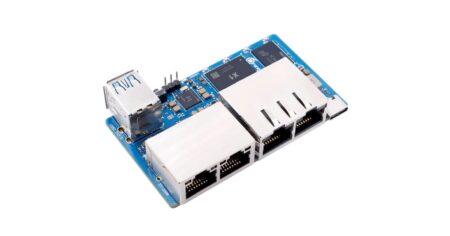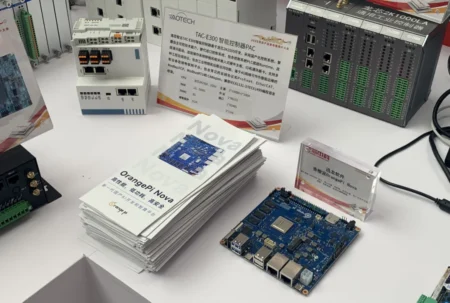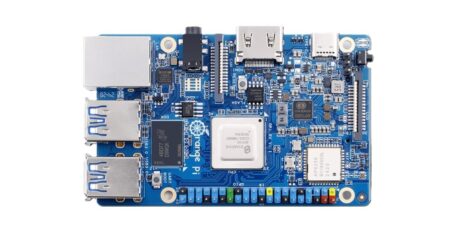- Maybe you missed it? Nanopi R6S Review.
- NanoPi R5C Review, Specifications, and Features.
NanoPi R5C
FriendlyElec, the company responsible for the popular NanoPi board series, has just released their latest product, the NanoPi R5C Router SBC. The newest model maintains the same compact shape as its predecessor, the NanoPi R4SE board. Let’s begin by exploring a few design improvements that are definitely worth considering.

NanoPi R5C

NanoPi R5C Specifications
- Configurations: Ram: 1GB/4GB LPDDR4X, Storage: 8GB/32B eMMC
- SoC: Rockchip RK35668B2
- CPU Cores: Quad-core ARM Cortex-A55 Frequency: 4 x Cortex-A55 up to 2.0GHz
- GPU: Mali-G52 1-Core-2EE supports OpenGL ES 1.1, 2.0, and 3.2, Vulkan 1.0 and 1.1, OpenCL 2.0
- NPU: Support 0.8T
- WiFi Support: Optional via M.2 Slot (WiFi and Bluetooth Module).
- 1x M.2 E-Key slot (PCIe 2.1 x1, USB 2.0 support)
- 1x MASK Button: eMMC update User Button.
- 1x HDMI 2.0 port
- 2x 2.5G Ethernet
- 2x USB 3.2 Gen 1 Type-A ports
- 1x microSD card reader with support for UHS-I cards
- OS Support: FriendlyWrt 22.03, Debian Buster Desktop, FriendlyCore Focal Lite(Base on Ubuntu 20.04) Buildroot.
- Kernel version Linux-5.10-LTS
- U-boot-2017.09
- Power: USB Type-C port for 5V power input
- 2 Pin 1.27/1.25mm RTC battery input connector for low power RTC IC HYM8563TS.
- 4 LED lights in-header Debug: Debug UART x1, 3 Pin 2.54mm header, 3.3V level, 1500000bps
- Weight: 38g (without Case) / 149g (with Case).
- PCB Dimension: 58x58x1.6mm mm (without Case) / 62.5×62.5x29mm mm (with Case).
Small and Compact
The NanoPi R5C (“R5C”) is a high-end FriendlyElec mini-router designed for lightweight edge-computing applications. It features dual Gbps Ethernet ports and measures 58 x 58 mm. The single board computer (SBC) is very lightweight, weighing only 1.34 ounces (38g). A fully-assembled system with antennas weighs around 6 ounces (170g), so it is very portable and can easily fit inside a small bag.
Hardware – Under the Hood
The NanoPi R5C is equipped with Rockchip’s powerful Rockchip RK35668B2 SoC, ensuring high performance. This SoC’s frequency can reach as high as 2.0GHz. The NanoPi R5C top model has 4GB LPDDR4 RAM, 32G eMMC, and dual 2.5Gbps Ethernet ports. It supports dynamic frequency scaling. It has two USB 3.2 Gen ports that can interface with external hard drives, 4G modules, USB HD cameras, USB WiFi modules, etc. In addition, it has a MASK key. The board will enter the USB installation mode when the key is pressed.

HDMI
You can use the HDMI 2.0 port on the NanoPi R5C as a lightweight Mini PC for running Linux OS. You can also use it as a multimedia device to stream music and play videos smoothly in resolutions ranging from 720P to 1080P. Based on our past checks, the RockChip-based hardware packed with a 4GB RAM configuration should be more than enough for such applications.
Software
The NanoPi R5C supports Ubuntu, Armbian, and FriendlyWrt (OpenWrt). It can be used as a portable firewall device to protect 1–3 computers and connect it to laptops or desktop computers. You can boot from the microSD card slot or use the eMMC flash chip option, which offers faster read/write speeds. You can also install an OS on the NanoPi R5C using a USB cable connected to a PC, but the options mentioned earlier are the easiest and fastest methods to load all the necessary OS files.
M.2 E-KEY Slot / Socket
With the new M.2 E-key socket, users can upgrade their current hardware configuration and add a Wireless Bluetooth WiFi Module card. FriendlyElec also added two antenna mounting holes inside their new metal case kit, closed and sealed with a pair of plastic corks.
NanoPi R5C with Wireless WIFI Network Card

2.5GbE Ports in, 1.0GbE out
FrienlyElec’s decision to replace 1GbE ports with dual 2.5GbE ports aligns with the increasing popularity of fiber internet, which can provide speeds beyond gigabit levels. This shift reflects the growing demand for high-speed connectivity and acknowledges the evolving requirements of users in the current digital landscape. That makes it ideal for home and outdoor applications that could benefit from a faster network connection.
Metal Case
FriendlyElec released a CNC metal case with fine engineering works for the NanoPi R5C. This metal case design offers excellent heat dissipation. In our test, the NanoPi R5C could run smoothly without frequency reduction when assembled with this metal case.
Price and Availability
The base bare board configuration of the NanoPi R5C is priced at $49, offering 1GB of RAM and 8GB of internal storage. For those seeking higher specifications, the higher model is available for $59, equipped with 4GB of RAM and 32GB of storage. Additionally, an optional Wi-Fi module can be purchased for just $18.





